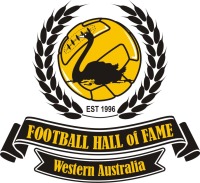Callies and the Great War
A DEVASTATING LOSS...
THE start of commemorations of the 100th anniversary of the beginning of World War One (1914-18) will provoke poignant memories for one WA football club in particular.
Caledonians, the club founded by the Fremantle Caledonian Society in 1913 by mainly expatriate Scots, was devastated by the "war to end all wars" when eight of its first team players were killed in the tragic events in Europe.
In all, 27 players and officials enlisted in the Australian forces which took part in the bitter four-year long conflict.
Eight of the players did not return. They were James 'Barney' Cowan, who died of a result of wounds received at the second battle of Paschendaele; William Chalmers, who was killed in action at Messines; Jamie Simpson, who died during the attack on Mouquet Farm, one of the bloodiest battles of the war; Charlie Monteath, who did not survive the battle of Villers-Bretonneux; Frank Lyon, who succumbed to pneumonia after many months of freezing trench warfare; Dave McKinnon, who was killed at Pozieres Heights; David 'Barney' Henry, who died during the siege at Mouquet Farm; Dickie Leonard, a sailor whose ship was torpedoed in the English Channel.
Football, or soccer as it was then known, was regularly played by Allied troops at Gallipoli and also amongst Australian troops based at Lemnos in Greece in 1915. Many feel the sport has never received the acknowledgement it deserves in Anzac commemorations. Victorian Sports historian Dr Ian Syson has revealed that records show an extensive and co-ordinated soccer programme within the Australian forces - and there was even an Anzac "Ashes" series between Aussie and New Zealand troops. The prize was a silver razor tin case, containing cigar ashes from one of the soldiers who landed at Gallipoli.
Top Callies players like Alex Marr, a goalkeeper who represented the State on many occasions, survived the hostilities and went on to become the father-figure of the club. The club's fairest and best award was named after him. He passed away in September 1984, aged 93.
Marr was inducted into the Football Hall of Fame WA's Hall of Champions in 1996, as was another legendary Calies player, William Waddell, who was only a boy at the start of the war and joined the club in the 1930s, spending 15 seasons there.
Pictured left: Alex Marr (left), William Waddell (second left) with the vast collection of trophies Callies had accumulated by 1938, including the tall and magnificent Charity Cup which the club won in five successive seasons.
Other former Caledonian players who have been inducted into the Hall of Fame are Stewart Johnson, Frank Reid, Jack Smethurst and former Australian international John Spanos, who began his career with Callies schoolboys side.
And Paul Strudwick, the club's hottest discovery in the 1990s who went on to star for Perth Glory, was included in the Century of Champions in 2004.
Callies started life as Fremantle Caledonians, initially playing at Fremantle Park (close to its headquarters at the old Caledonian Hall on the corner of James and Quarry Streets) and then going on to East Fremantle Polo Grounds (Richmond Raceway) and to Mann Oval in Mosman Park. In 1961 it was on to the Perth Esplanade, Woodville Reserve and Lake Monger Velodrome before arriving at its current home, Jubilee Reserve in Bassendean.
Caledonians was one of the power-house clubs during its golden years - from the late 1920s through to the late 1940s - winning seven top league championships, six Charity Cups and seven Challenge Cups. After several tough years, Calies is now restricted to amateurs teams, women's sides and juniors.
An excellent book about the club's early years, entitled "Soccer Anzacs", was produced by John Williamson in 1998. (A pic page of some of the Callies World War 1 enlistees is reproduced above).
As well as giving a detailed account of the Callies players and their war-time activities, Williamson relates that Callies wasn't the only WA club to suffer casualties during the Great War, with some 300 players and officials from clubs around the State enlisting. Further afield, 16 players from Scottish club Heart of Midlothian enlisted, along with 500 of the club's supporters. Seven Hearts players were killed. There is a memorial plaque at the club's ground Tynecastle in Edinburgh.
*A total of 416,809 Australians enlisted in the Australian forces, of which 32,231 were from WA. Australia suffered its highest ever mortality rate, with 61,720 being killed and over 156,000 wounded.
*Fremantle Council will hold various events honouring the 849 Fremantle soldiers known to have fallen during World War 1. On 31 October 2014 a commemorative service will be held at the Fremantle Port. This date marks the departure of the convoy that carried Western Australia's first expeditionary forces to Gallipoli and the Western Front from Fremantle. The people of Fremantle are proud to be part of the ANZAC Centenary commemorations and to have the opportunity to honour and pay respect to those who have and are serving our nation as part of the Armed Forces. The Council invites input on its website, www.anzacfremantle.com.au















Comments
Comment Guidelines: The SportsTG Network is made up of players, families and passionate sports followers like you who have a strong opinion about sport. That's great - we want you to have your say and share your thoughts with the world. However, we have a few rules that you must follow to keep it fun for all. Please don't be rude, abusive, swear or vilify others. Apart from some pretty serious sport sanctions, we also can ban you and report you if things get out of hand. So play fair and have fun, and thanks for your contribution.